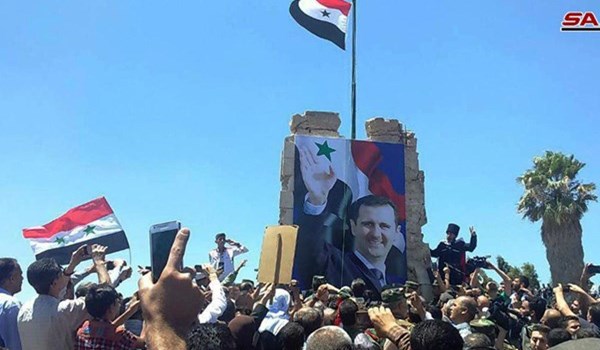
RNA - Polling booths opened at 7am local time across government-held parts of the country where more than 40,000 candidates competed for 18,478 seats on local administrative councils. Voting was extended by five hours until midnight because of high turnout. Voting was similarly extended in 2014 when President Bashar al-Assad won a landslide victory with 88.7 percent of the vote.
The number of seats in this year's elections slightly increased from the roughly 17,000 available posts in the last elections, as smaller villages have been promoted to fully fledged municipalities. Council members serve four-year terms at the municipal level and are mostly responsible for service provision and other administrative matters. Those elected in this round are expected to have more responsibilities than their predecessors, particularly linked to reconstruction and urban development.
Seeing that the international power players are behind their country’s devastating war and that only Syrian people can shape their future, many voters were quick to cast their ballots in Damascus, Tartus and Latakia, as well as the eastern city Deir Ezzur, recaptured last year from ISIL and Al-Qaeda.
Regrettably, no voting took place in areas outside government control, including Kurdish-held parts of the northeast and the northwest Idlib province, the largest remaining terror-held territory. That is set to change, of course, as they will be liberated soon. Much of the country has been liberated, which is why people were optimistic when casting their ballots.
This is by no means an attempt to say that after the vote Syria will change immediately. Far from it, there are still many challenges ahead, including liberation of terror-held regions and nationwide reconstruction efforts which will need international funds. Besides, just like any other place in the world, democracy in Syria is not perfect. This is because we are not living in a perfect world.
And there is a reason why the United States and its regional Arab allies were quick to dismiss the election as illegitimate. They did the same when Syrians elected President Assad for another seven years in the previous vote. The regime changers have lost the war and the voting means they can no longer game the Syrian people, or justify their military presence, occupation and support for militant groups.
According to Fars News Agency, the good news is that some Western governments have finally come to their senses and support the Sunday vote, knowing full well that the ongoing war was never about freedom and democracy. For instance, the Netherlands has just shut down all support for multiple factions within Syria, including the White Helmets organization. The White Helmets were recipients of 12.5 million Euros from the Netherlands.
Styling themselves as a “civil defense” force with no ties to foreign governments, the White Helmets actually receive substantial funding from several Western nations, including the US, Britain, and until now, the Netherlands. At the same time, they work with Qaeda-allied rebel forces in places like Idlib. They even get direct support from Israel!
In other words, there is inadequate supervision of the White Helmets, and the lack of transparency on the flow of cash to the Qaeda-allied group and how it is spent, raises substantial risk that the aid money falls into the hands of terrorist groups. Nonetheless, voting is very important for Syria’s democracy and international aid has to go directly to the government they elect – not terrorist militants and certainly not Qaeda-allied “civil defense” entities.
In summation, one of the responsibilities of Syrian citizens is to take part in their democracy. By rejecting foreign meddling and voting in Sunday’s elections, they once again supported their government and their candidates. By becoming an informed citizen, they made clear that they are familiar with the key issues facing their post-war country. They made informed choices when they voted for their favorite council members and got involved in politics to make a difference.
Syrian citizens know full well that not-voting or spoiling ballot won’t influence their government’s decisions. They know that it does not pay to be apolitical or depend on outside powers, and that now is the time to fight for policies that they feel can have a huge difference in rebuilding their communities and shaping the future of their country. Syrians now appreciate the value of democracy and informed decision-making more than anyone else in the world.
847/940